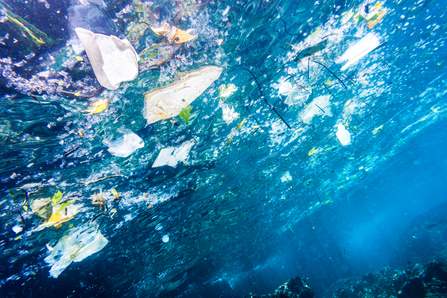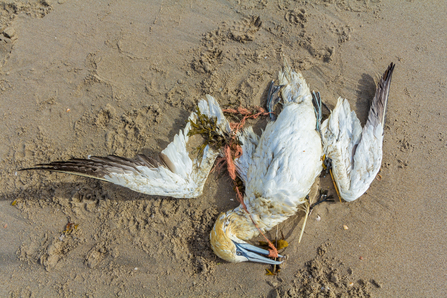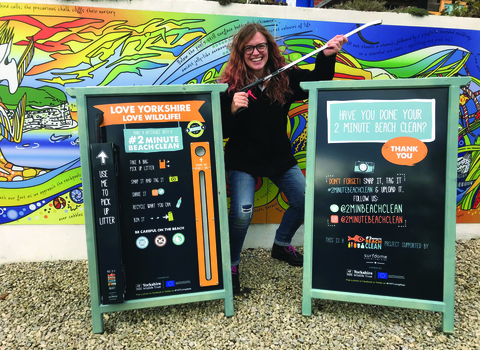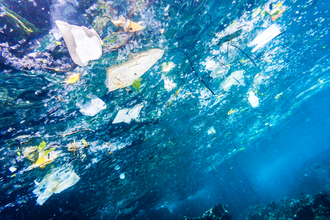A tideline of plastic and polystyrene...
Gazing out on a sunny day from Yorkshire’s coast is a breathtaking experience. Glimmers of teal, cobalt, turquoise and sapphire dance, breaking waves create clouds of spray and, if you’re lucky, a silver bodied dancing dolphin leaps from the depths or a bright beaked puffin streaks down to catch a fish beneath the water.
But the magic of our coast is fading fast.
Yorkshire’s wildlife is under threat - every day we see the shocking impact of human activity on our seas. Tiny micro-plastics and tangles of deadly rubbish are polluting our beaches and choking our wildlife. Agricultural runoff, pesticides and untreated sewage fill our seas with toxic chemicals. And our wild creatures, from tiny crabs to majestic whales, suffer stomachs blocked with plastic and chemical-filled waters.
We're working with sea users and communities up and down the Yorkshire's coast to clean up our seas and safely collect waste before it enters the water. We need your help so we can continue this vital work and save our incredible marine wildlife.
Every donation brings us closer to a clean and healthy underwater world.

The future of our seas could be cleaner, healthier and wilder.
What's the damage?

Plastic, plastic everywhere...
Approximately 20,000 tonnes of litter and waste is dumped into the North Sea every year, and only 15% of that is washed ashore – the rest is still in the water.
From seabed to shore, our seas are drowning in plastic. Seabirds pick up discarded plastics to build their nest and unwittingly strangle their chicks, while whales wash up with stomachs bursting with plastic bags. Plankton digest tiny micro-plastics, while dolphins become so entangled in fishing gear they cannot hunt and starve. It is predicted that there will be more plastic than fish in our seas by 2050.

Ghost gear
Unintentionally lost or abandoned nets and lines that get caught on rocks or damaged at sea are wreaking havoc on marine wildlife.
The nets and lines entrap fish and crabs, which attract seals and other wildlife who also become entangled. The very nature of their design means escape is almost impossible.
Hooks and lines get caught around the feet and beaks of seabirds and around the tails and fins of fish and dolphins. Entanglement prevents them from hunting and breathing, impairs their ability to raise young, and ultimately causes their death.
Plastic pollution, along with other pollutants including sewage, agricultural run-off and pesticides, is poisoning our seas and threatening our marine wildlife.
If we do nothing, Yorkshire’s seas could be devoid of all the iconic species we love and cherish within decades.
But we can change the ending of this story.

A young female grey seal (Halichoerus grypus) swims over kelp. Photographed in July. Farne Islands, Northumberland, England, British Isles. North Sea - Alexander Mustard/2020VISION
With your help, we can clean up our seas

From source to sea
With your support, we can return Yorkshire's amazing seas to their former splendour. Crabs and starfish fill the reefs and shoals of fish dance through kelp forests and seagrass meadows, and dolphins and whales sing in chorus with the clifftop orchestra of puffins, gannets and kittiwakes. Our seas will be clean, healthy and abundant.
By working with Yorkshire’s urban, rural and coastal communities and partnering with other innovative organisations and experts, we will change the fate of our marine world. Protecting and restoring our incredible seascapes for centuries to come isn’t easy, but it is possible and necessary.

Fishing For Litter
By providing free disposal for old or discarded fishing waste at harbour sides, our Fishing for Litter scheme prevents rubbish from entering our seas in the first place. Previously, sea users would have to pay to dispose of this at a cost unaffordable for many smaller vessels.
Our scheme removes this barrier and makes it easy to safely dispose of fishing waste. Fewer animals will become entangled and trapped, and fishing communities are supported - they have to spend less time extracting litter from their nets.
We're working in partnership with Scarborough Borough Council, East Riding of Yorkshire Council and the fishing community to install disposal sites up and down the Yorkshire coast. With your help, we work towards a goal that every sea user knows when and where they can safely dispose of marine litter.
80% of marine pollution comes from the land. From choking micro-plastics to toxic pesticides and sewage, the work to clean up our seas begins far inland.

2 minute beach clean
Inspiring people to take action
We want everyone across Yorkshire to understand where marine pollution comes from and how they can take help clean up our seas. We work with schools and communities to educate and inspire about our incredible seas and wildlife, from after-school clubs to our monthly Living Seas Live webinars.
We organise regular beach cleans up and down Yorkshire's coast and work with partners to display 2 Minute Beach Clean boards, making it easier for everyone to do their bit. But with your help, we could do so much more.
Our vision for cleaner seas
We have a vision of a Yorkshire where seabirds can nest without their young becoming entangled, and where underwater creatures can feed on as nature intended with their stomachs free from plastic bags. The work we are doing is helping us to create a more sustainable, healthier future for our seas.
- By monitoring the types and composition of litter, we can inform other initiatives designed to further reduce marine plastics. We can use this information to combat litter at its source, by designing more resilient equipment, using less damaging materials and developing efficient closed-cycle recycling economies, so nothing goes to landfill or ends up in our seas.
- By working with the fishing community and creating stronger relationships and partnerships we can work together to undertake surveys and gather data. This helps us to better safeguard Marine Protected Areas and to co-create best practices to further protect our seas and wildlife - while ensuring that the livelihoods of those who depend on the sea are protected.

Donate £22
£22 could provide essential litter picking equipment to help keep our seas and coastlines plastic free.Donate £73
£73 could buy the trestles needed to reintroduce native oysters into our seas
Donate £122
£122 could allow us to deliver a stakeholder & community workshop to increase understanding about marine pollutionHelp us solve the problem.
And finally...
Can you Give Seas a Chance by sharing our campaign on social media?
Thank you for your support!





